Criminal Law and Procedures: Analysis of Arrest and Trial Process
VerifiedAdded on 2023/06/11
|8
|2428
|478
Essay
AI Summary
This essay provides a detailed analysis of criminal law and procedures in the United Kingdom, focusing on the process from arrest to trial of a defendant. It examines the powers and duties of police officers during arrest, including the legal requirements under the Police and Criminal Evidence Act 1984 (PACE). The essay also discusses the structure of criminal tribunals, the roles of key personnel such as judges and magistrates, and the provision of legal assistance through the Criminal Defence Service. Furthermore, it explores various punishment theories, the aims of sentencing as outlined in the Criminal Justice Act 2003, and the different types of sentences available for both juvenile and adult offenders, including discharges, fines, referral orders, and custodial sentences. The assignment concludes by emphasizing the importance of understanding these legal processes within the UK criminal justice system, highlighting the role of rehabilitation and deterrence in sentencing.
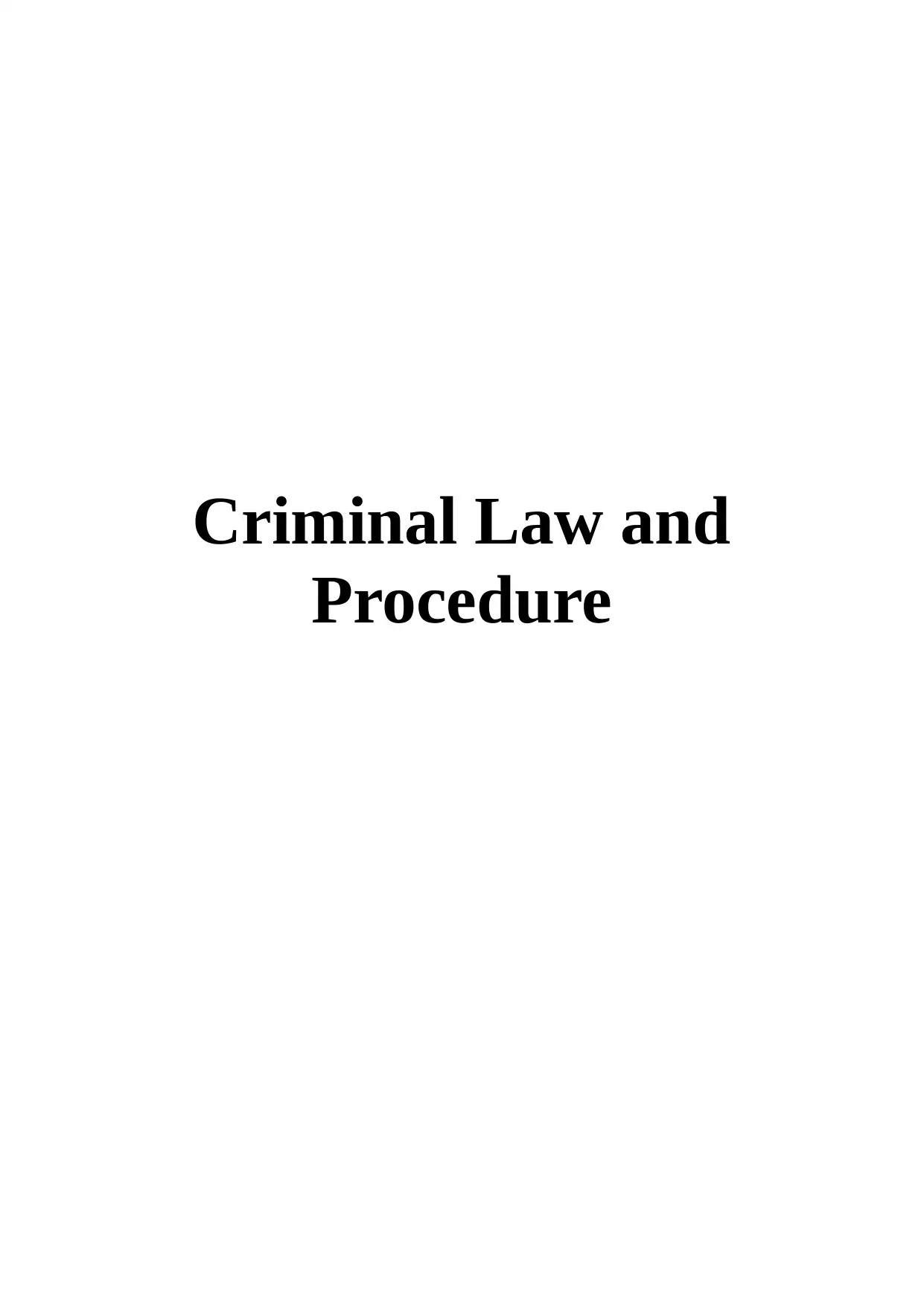
Criminal Law and
Procedure
Procedure
Paraphrase This Document
Need a fresh take? Get an instant paraphrase of this document with our AI Paraphraser
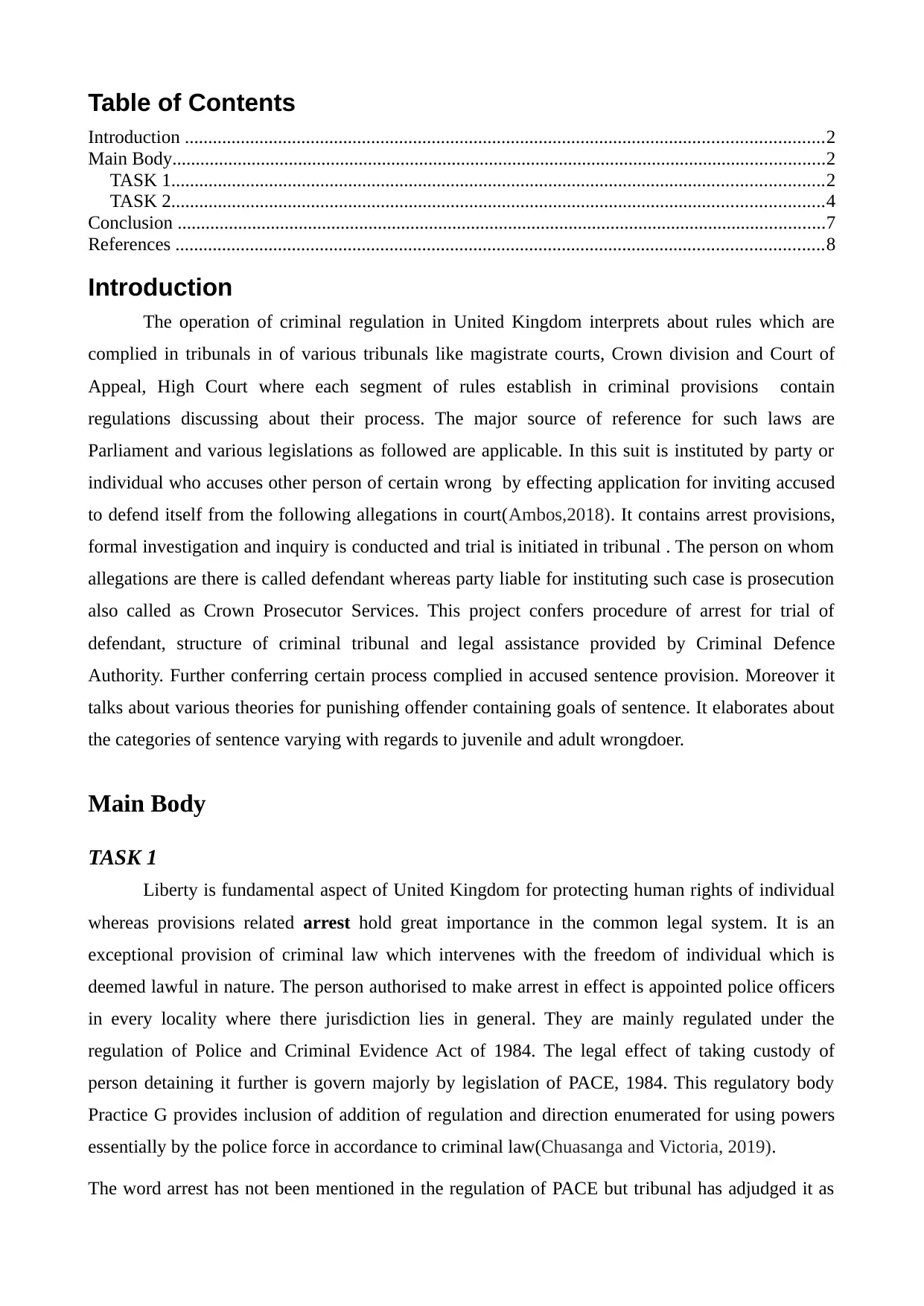
Table of Contents
Introduction .........................................................................................................................................2
Main Body............................................................................................................................................2
TASK 1............................................................................................................................................2
TASK 2............................................................................................................................................4
Conclusion ...........................................................................................................................................7
References ...........................................................................................................................................8
Introduction
The operation of criminal regulation in United Kingdom interprets about rules which are
complied in tribunals in of various tribunals like magistrate courts, Crown division and Court of
Appeal, High Court where each segment of rules establish in criminal provisions contain
regulations discussing about their process. The major source of reference for such laws are
Parliament and various legislations as followed are applicable. In this suit is instituted by party or
individual who accuses other person of certain wrong by effecting application for inviting accused
to defend itself from the following allegations in court(Ambos,2018). It contains arrest provisions,
formal investigation and inquiry is conducted and trial is initiated in tribunal . The person on whom
allegations are there is called defendant whereas party liable for instituting such case is prosecution
also called as Crown Prosecutor Services. This project confers procedure of arrest for trial of
defendant, structure of criminal tribunal and legal assistance provided by Criminal Defence
Authority. Further conferring certain process complied in accused sentence provision. Moreover it
talks about various theories for punishing offender containing goals of sentence. It elaborates about
the categories of sentence varying with regards to juvenile and adult wrongdoer.
Main Body
TASK 1
Liberty is fundamental aspect of United Kingdom for protecting human rights of individual
whereas provisions related arrest hold great importance in the common legal system. It is an
exceptional provision of criminal law which intervenes with the freedom of individual which is
deemed lawful in nature. The person authorised to make arrest in effect is appointed police officers
in every locality where there jurisdiction lies in general. They are mainly regulated under the
regulation of Police and Criminal Evidence Act of 1984. The legal effect of taking custody of
person detaining it further is govern majorly by legislation of PACE, 1984. This regulatory body
Practice G provides inclusion of addition of regulation and direction enumerated for using powers
essentially by the police force in accordance to criminal law(Chuasanga and Victoria, 2019).
The word arrest has not been mentioned in the regulation of PACE but tribunal has adjudged it as
Introduction .........................................................................................................................................2
Main Body............................................................................................................................................2
TASK 1............................................................................................................................................2
TASK 2............................................................................................................................................4
Conclusion ...........................................................................................................................................7
References ...........................................................................................................................................8
Introduction
The operation of criminal regulation in United Kingdom interprets about rules which are
complied in tribunals in of various tribunals like magistrate courts, Crown division and Court of
Appeal, High Court where each segment of rules establish in criminal provisions contain
regulations discussing about their process. The major source of reference for such laws are
Parliament and various legislations as followed are applicable. In this suit is instituted by party or
individual who accuses other person of certain wrong by effecting application for inviting accused
to defend itself from the following allegations in court(Ambos,2018). It contains arrest provisions,
formal investigation and inquiry is conducted and trial is initiated in tribunal . The person on whom
allegations are there is called defendant whereas party liable for instituting such case is prosecution
also called as Crown Prosecutor Services. This project confers procedure of arrest for trial of
defendant, structure of criminal tribunal and legal assistance provided by Criminal Defence
Authority. Further conferring certain process complied in accused sentence provision. Moreover it
talks about various theories for punishing offender containing goals of sentence. It elaborates about
the categories of sentence varying with regards to juvenile and adult wrongdoer.
Main Body
TASK 1
Liberty is fundamental aspect of United Kingdom for protecting human rights of individual
whereas provisions related arrest hold great importance in the common legal system. It is an
exceptional provision of criminal law which intervenes with the freedom of individual which is
deemed lawful in nature. The person authorised to make arrest in effect is appointed police officers
in every locality where there jurisdiction lies in general. They are mainly regulated under the
regulation of Police and Criminal Evidence Act of 1984. The legal effect of taking custody of
person detaining it further is govern majorly by legislation of PACE, 1984. This regulatory body
Practice G provides inclusion of addition of regulation and direction enumerated for using powers
essentially by the police force in accordance to criminal law(Chuasanga and Victoria, 2019).
The word arrest has not been mentioned in the regulation of PACE but tribunal has adjudged it as
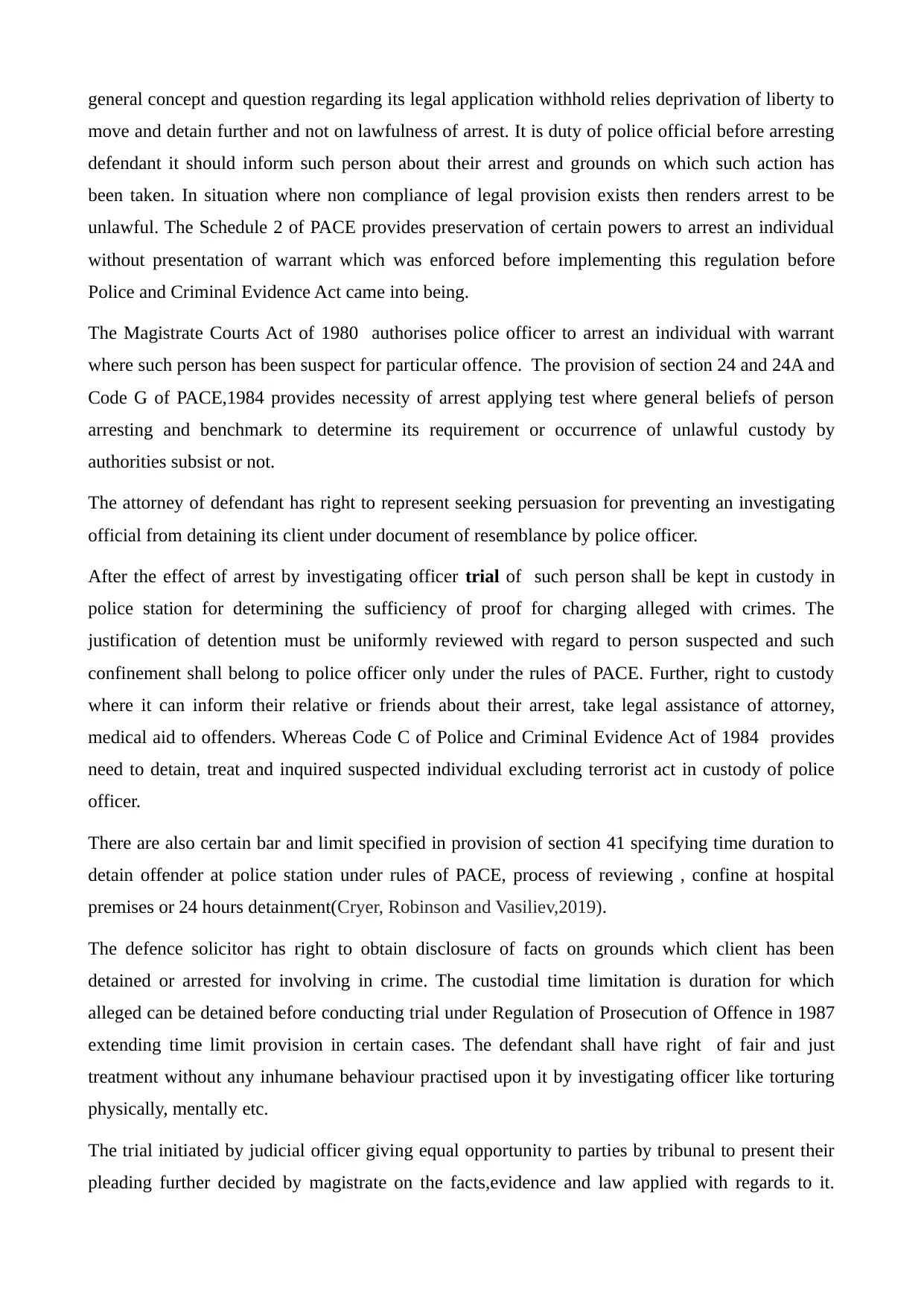
general concept and question regarding its legal application withhold relies deprivation of liberty to
move and detain further and not on lawfulness of arrest. It is duty of police official before arresting
defendant it should inform such person about their arrest and grounds on which such action has
been taken. In situation where non compliance of legal provision exists then renders arrest to be
unlawful. The Schedule 2 of PACE provides preservation of certain powers to arrest an individual
without presentation of warrant which was enforced before implementing this regulation before
Police and Criminal Evidence Act came into being.
The Magistrate Courts Act of 1980 authorises police officer to arrest an individual with warrant
where such person has been suspect for particular offence. The provision of section 24 and 24A and
Code G of PACE,1984 provides necessity of arrest applying test where general beliefs of person
arresting and benchmark to determine its requirement or occurrence of unlawful custody by
authorities subsist or not.
The attorney of defendant has right to represent seeking persuasion for preventing an investigating
official from detaining its client under document of resemblance by police officer.
After the effect of arrest by investigating officer trial of such person shall be kept in custody in
police station for determining the sufficiency of proof for charging alleged with crimes. The
justification of detention must be uniformly reviewed with regard to person suspected and such
confinement shall belong to police officer only under the rules of PACE. Further, right to custody
where it can inform their relative or friends about their arrest, take legal assistance of attorney,
medical aid to offenders. Whereas Code C of Police and Criminal Evidence Act of 1984 provides
need to detain, treat and inquired suspected individual excluding terrorist act in custody of police
officer.
There are also certain bar and limit specified in provision of section 41 specifying time duration to
detain offender at police station under rules of PACE, process of reviewing , confine at hospital
premises or 24 hours detainment(Cryer, Robinson and Vasiliev,2019).
The defence solicitor has right to obtain disclosure of facts on grounds which client has been
detained or arrested for involving in crime. The custodial time limitation is duration for which
alleged can be detained before conducting trial under Regulation of Prosecution of Offence in 1987
extending time limit provision in certain cases. The defendant shall have right of fair and just
treatment without any inhumane behaviour practised upon it by investigating officer like torturing
physically, mentally etc.
The trial initiated by judicial officer giving equal opportunity to parties by tribunal to present their
pleading further decided by magistrate on the facts,evidence and law applied with regards to it.
move and detain further and not on lawfulness of arrest. It is duty of police official before arresting
defendant it should inform such person about their arrest and grounds on which such action has
been taken. In situation where non compliance of legal provision exists then renders arrest to be
unlawful. The Schedule 2 of PACE provides preservation of certain powers to arrest an individual
without presentation of warrant which was enforced before implementing this regulation before
Police and Criminal Evidence Act came into being.
The Magistrate Courts Act of 1980 authorises police officer to arrest an individual with warrant
where such person has been suspect for particular offence. The provision of section 24 and 24A and
Code G of PACE,1984 provides necessity of arrest applying test where general beliefs of person
arresting and benchmark to determine its requirement or occurrence of unlawful custody by
authorities subsist or not.
The attorney of defendant has right to represent seeking persuasion for preventing an investigating
official from detaining its client under document of resemblance by police officer.
After the effect of arrest by investigating officer trial of such person shall be kept in custody in
police station for determining the sufficiency of proof for charging alleged with crimes. The
justification of detention must be uniformly reviewed with regard to person suspected and such
confinement shall belong to police officer only under the rules of PACE. Further, right to custody
where it can inform their relative or friends about their arrest, take legal assistance of attorney,
medical aid to offenders. Whereas Code C of Police and Criminal Evidence Act of 1984 provides
need to detain, treat and inquired suspected individual excluding terrorist act in custody of police
officer.
There are also certain bar and limit specified in provision of section 41 specifying time duration to
detain offender at police station under rules of PACE, process of reviewing , confine at hospital
premises or 24 hours detainment(Cryer, Robinson and Vasiliev,2019).
The defence solicitor has right to obtain disclosure of facts on grounds which client has been
detained or arrested for involving in crime. The custodial time limitation is duration for which
alleged can be detained before conducting trial under Regulation of Prosecution of Offence in 1987
extending time limit provision in certain cases. The defendant shall have right of fair and just
treatment without any inhumane behaviour practised upon it by investigating officer like torturing
physically, mentally etc.
The trial initiated by judicial officer giving equal opportunity to parties by tribunal to present their
pleading further decided by magistrate on the facts,evidence and law applied with regards to it.
⊘ This is a preview!⊘
Do you want full access?
Subscribe today to unlock all pages.

Trusted by 1+ million students worldwide
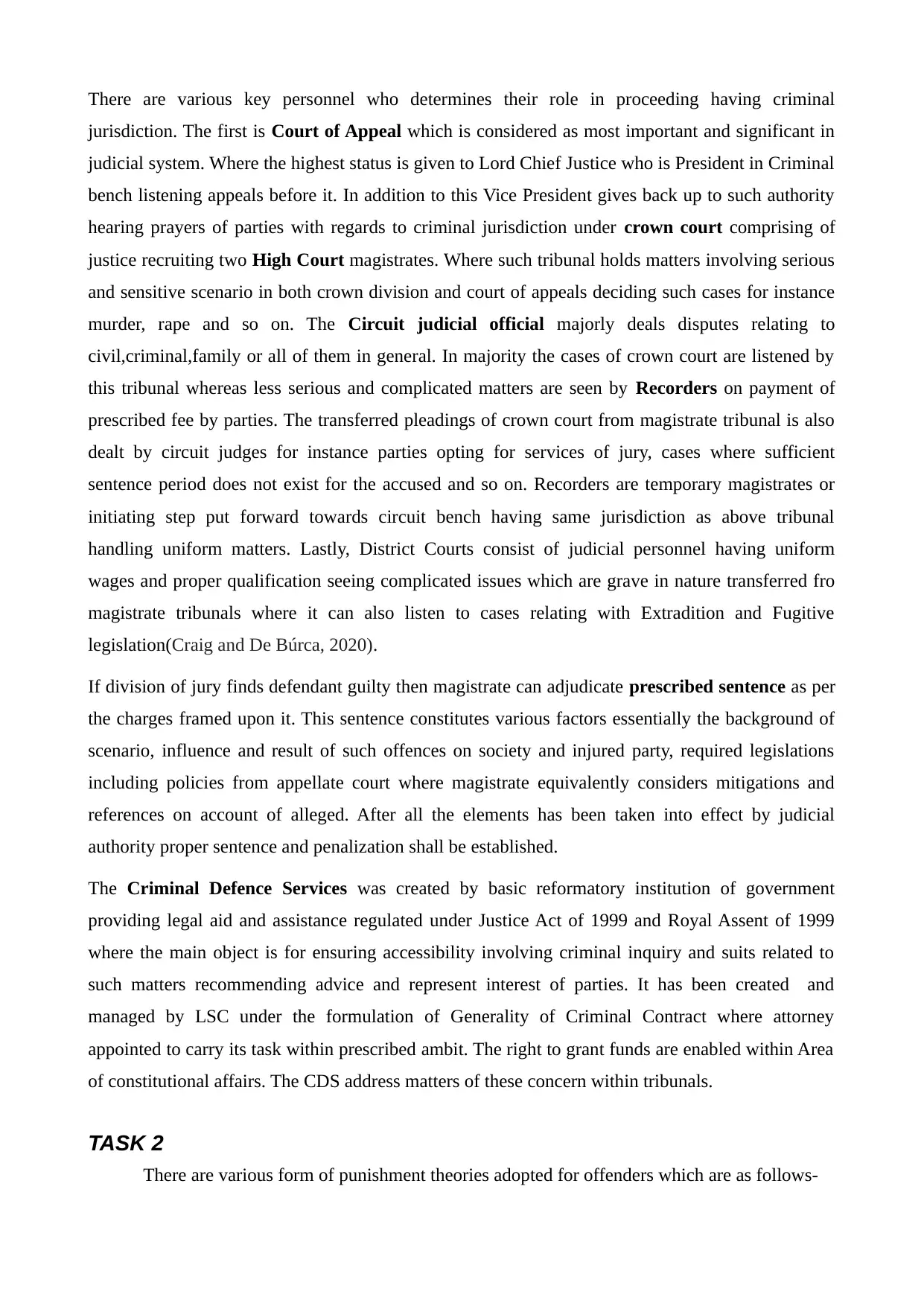
There are various key personnel who determines their role in proceeding having criminal
jurisdiction. The first is Court of Appeal which is considered as most important and significant in
judicial system. Where the highest status is given to Lord Chief Justice who is President in Criminal
bench listening appeals before it. In addition to this Vice President gives back up to such authority
hearing prayers of parties with regards to criminal jurisdiction under crown court comprising of
justice recruiting two High Court magistrates. Where such tribunal holds matters involving serious
and sensitive scenario in both crown division and court of appeals deciding such cases for instance
murder, rape and so on. The Circuit judicial official majorly deals disputes relating to
civil,criminal,family or all of them in general. In majority the cases of crown court are listened by
this tribunal whereas less serious and complicated matters are seen by Recorders on payment of
prescribed fee by parties. The transferred pleadings of crown court from magistrate tribunal is also
dealt by circuit judges for instance parties opting for services of jury, cases where sufficient
sentence period does not exist for the accused and so on. Recorders are temporary magistrates or
initiating step put forward towards circuit bench having same jurisdiction as above tribunal
handling uniform matters. Lastly, District Courts consist of judicial personnel having uniform
wages and proper qualification seeing complicated issues which are grave in nature transferred fro
magistrate tribunals where it can also listen to cases relating with Extradition and Fugitive
legislation(Craig and De Búrca, 2020).
If division of jury finds defendant guilty then magistrate can adjudicate prescribed sentence as per
the charges framed upon it. This sentence constitutes various factors essentially the background of
scenario, influence and result of such offences on society and injured party, required legislations
including policies from appellate court where magistrate equivalently considers mitigations and
references on account of alleged. After all the elements has been taken into effect by judicial
authority proper sentence and penalization shall be established.
The Criminal Defence Services was created by basic reformatory institution of government
providing legal aid and assistance regulated under Justice Act of 1999 and Royal Assent of 1999
where the main object is for ensuring accessibility involving criminal inquiry and suits related to
such matters recommending advice and represent interest of parties. It has been created and
managed by LSC under the formulation of Generality of Criminal Contract where attorney
appointed to carry its task within prescribed ambit. The right to grant funds are enabled within Area
of constitutional affairs. The CDS address matters of these concern within tribunals.
TASK 2
There are various form of punishment theories adopted for offenders which are as follows-
jurisdiction. The first is Court of Appeal which is considered as most important and significant in
judicial system. Where the highest status is given to Lord Chief Justice who is President in Criminal
bench listening appeals before it. In addition to this Vice President gives back up to such authority
hearing prayers of parties with regards to criminal jurisdiction under crown court comprising of
justice recruiting two High Court magistrates. Where such tribunal holds matters involving serious
and sensitive scenario in both crown division and court of appeals deciding such cases for instance
murder, rape and so on. The Circuit judicial official majorly deals disputes relating to
civil,criminal,family or all of them in general. In majority the cases of crown court are listened by
this tribunal whereas less serious and complicated matters are seen by Recorders on payment of
prescribed fee by parties. The transferred pleadings of crown court from magistrate tribunal is also
dealt by circuit judges for instance parties opting for services of jury, cases where sufficient
sentence period does not exist for the accused and so on. Recorders are temporary magistrates or
initiating step put forward towards circuit bench having same jurisdiction as above tribunal
handling uniform matters. Lastly, District Courts consist of judicial personnel having uniform
wages and proper qualification seeing complicated issues which are grave in nature transferred fro
magistrate tribunals where it can also listen to cases relating with Extradition and Fugitive
legislation(Craig and De Búrca, 2020).
If division of jury finds defendant guilty then magistrate can adjudicate prescribed sentence as per
the charges framed upon it. This sentence constitutes various factors essentially the background of
scenario, influence and result of such offences on society and injured party, required legislations
including policies from appellate court where magistrate equivalently considers mitigations and
references on account of alleged. After all the elements has been taken into effect by judicial
authority proper sentence and penalization shall be established.
The Criminal Defence Services was created by basic reformatory institution of government
providing legal aid and assistance regulated under Justice Act of 1999 and Royal Assent of 1999
where the main object is for ensuring accessibility involving criminal inquiry and suits related to
such matters recommending advice and represent interest of parties. It has been created and
managed by LSC under the formulation of Generality of Criminal Contract where attorney
appointed to carry its task within prescribed ambit. The right to grant funds are enabled within Area
of constitutional affairs. The CDS address matters of these concern within tribunals.
TASK 2
There are various form of punishment theories adopted for offenders which are as follows-
Paraphrase This Document
Need a fresh take? Get an instant paraphrase of this document with our AI Paraphraser
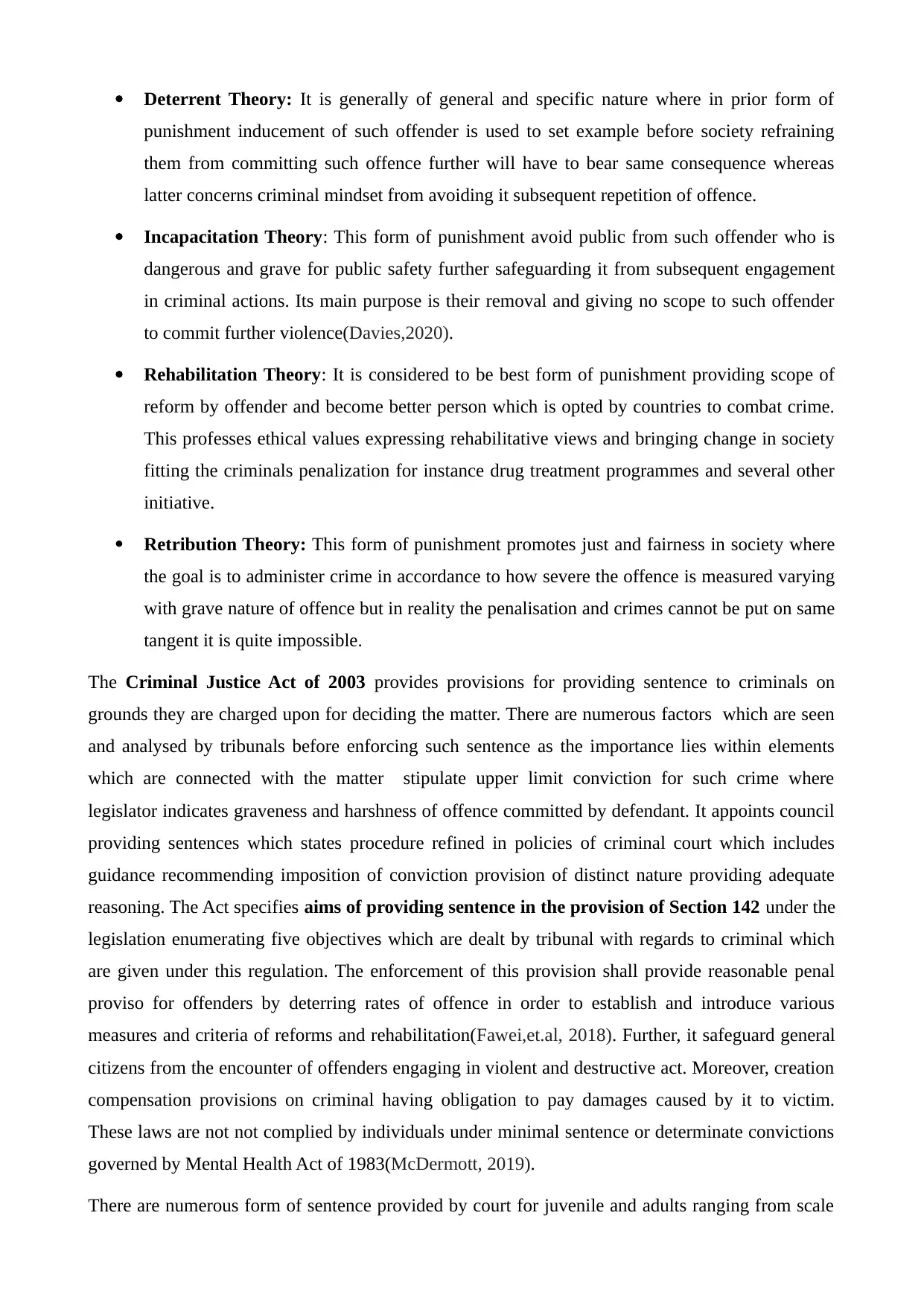
Deterrent Theory: It is generally of general and specific nature where in prior form of
punishment inducement of such offender is used to set example before society refraining
them from committing such offence further will have to bear same consequence whereas
latter concerns criminal mindset from avoiding it subsequent repetition of offence.
Incapacitation Theory: This form of punishment avoid public from such offender who is
dangerous and grave for public safety further safeguarding it from subsequent engagement
in criminal actions. Its main purpose is their removal and giving no scope to such offender
to commit further violence(Davies,2020).
Rehabilitation Theory: It is considered to be best form of punishment providing scope of
reform by offender and become better person which is opted by countries to combat crime.
This professes ethical values expressing rehabilitative views and bringing change in society
fitting the criminals penalization for instance drug treatment programmes and several other
initiative.
Retribution Theory: This form of punishment promotes just and fairness in society where
the goal is to administer crime in accordance to how severe the offence is measured varying
with grave nature of offence but in reality the penalisation and crimes cannot be put on same
tangent it is quite impossible.
The Criminal Justice Act of 2003 provides provisions for providing sentence to criminals on
grounds they are charged upon for deciding the matter. There are numerous factors which are seen
and analysed by tribunals before enforcing such sentence as the importance lies within elements
which are connected with the matter stipulate upper limit conviction for such crime where
legislator indicates graveness and harshness of offence committed by defendant. It appoints council
providing sentences which states procedure refined in policies of criminal court which includes
guidance recommending imposition of conviction provision of distinct nature providing adequate
reasoning. The Act specifies aims of providing sentence in the provision of Section 142 under the
legislation enumerating five objectives which are dealt by tribunal with regards to criminal which
are given under this regulation. The enforcement of this provision shall provide reasonable penal
proviso for offenders by deterring rates of offence in order to establish and introduce various
measures and criteria of reforms and rehabilitation(Fawei,et.al, 2018). Further, it safeguard general
citizens from the encounter of offenders engaging in violent and destructive act. Moreover, creation
compensation provisions on criminal having obligation to pay damages caused by it to victim.
These laws are not not complied by individuals under minimal sentence or determinate convictions
governed by Mental Health Act of 1983(McDermott, 2019).
There are numerous form of sentence provided by court for juvenile and adults ranging from scale
punishment inducement of such offender is used to set example before society refraining
them from committing such offence further will have to bear same consequence whereas
latter concerns criminal mindset from avoiding it subsequent repetition of offence.
Incapacitation Theory: This form of punishment avoid public from such offender who is
dangerous and grave for public safety further safeguarding it from subsequent engagement
in criminal actions. Its main purpose is their removal and giving no scope to such offender
to commit further violence(Davies,2020).
Rehabilitation Theory: It is considered to be best form of punishment providing scope of
reform by offender and become better person which is opted by countries to combat crime.
This professes ethical values expressing rehabilitative views and bringing change in society
fitting the criminals penalization for instance drug treatment programmes and several other
initiative.
Retribution Theory: This form of punishment promotes just and fairness in society where
the goal is to administer crime in accordance to how severe the offence is measured varying
with grave nature of offence but in reality the penalisation and crimes cannot be put on same
tangent it is quite impossible.
The Criminal Justice Act of 2003 provides provisions for providing sentence to criminals on
grounds they are charged upon for deciding the matter. There are numerous factors which are seen
and analysed by tribunals before enforcing such sentence as the importance lies within elements
which are connected with the matter stipulate upper limit conviction for such crime where
legislator indicates graveness and harshness of offence committed by defendant. It appoints council
providing sentences which states procedure refined in policies of criminal court which includes
guidance recommending imposition of conviction provision of distinct nature providing adequate
reasoning. The Act specifies aims of providing sentence in the provision of Section 142 under the
legislation enumerating five objectives which are dealt by tribunal with regards to criminal which
are given under this regulation. The enforcement of this provision shall provide reasonable penal
proviso for offenders by deterring rates of offence in order to establish and introduce various
measures and criteria of reforms and rehabilitation(Fawei,et.al, 2018). Further, it safeguard general
citizens from the encounter of offenders engaging in violent and destructive act. Moreover, creation
compensation provisions on criminal having obligation to pay damages caused by it to victim.
These laws are not not complied by individuals under minimal sentence or determinate convictions
governed by Mental Health Act of 1983(McDermott, 2019).
There are numerous form of sentence provided by court for juvenile and adults ranging from scale
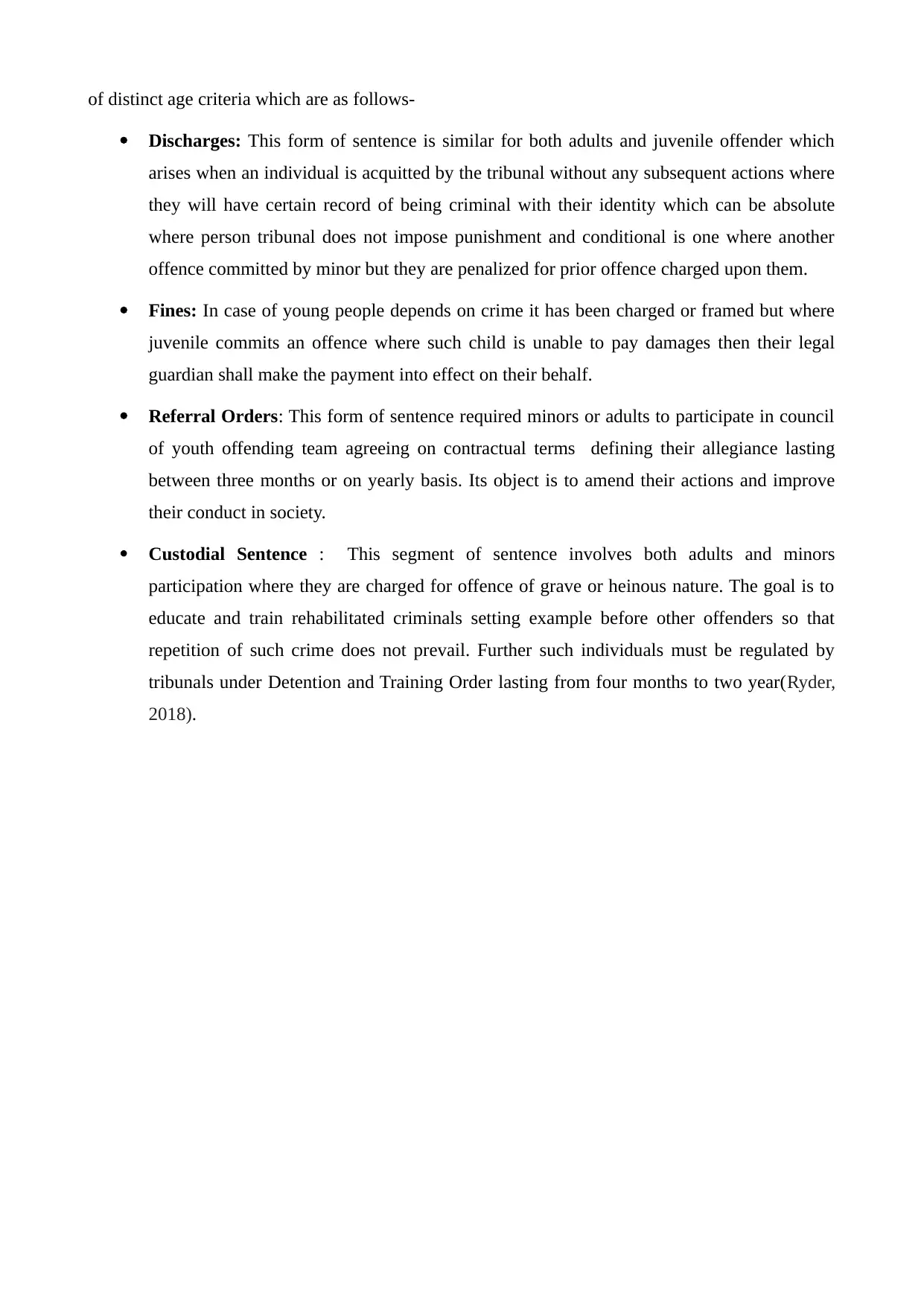
of distinct age criteria which are as follows-
Discharges: This form of sentence is similar for both adults and juvenile offender which
arises when an individual is acquitted by the tribunal without any subsequent actions where
they will have certain record of being criminal with their identity which can be absolute
where person tribunal does not impose punishment and conditional is one where another
offence committed by minor but they are penalized for prior offence charged upon them.
Fines: In case of young people depends on crime it has been charged or framed but where
juvenile commits an offence where such child is unable to pay damages then their legal
guardian shall make the payment into effect on their behalf.
Referral Orders: This form of sentence required minors or adults to participate in council
of youth offending team agreeing on contractual terms defining their allegiance lasting
between three months or on yearly basis. Its object is to amend their actions and improve
their conduct in society.
Custodial Sentence : This segment of sentence involves both adults and minors
participation where they are charged for offence of grave or heinous nature. The goal is to
educate and train rehabilitated criminals setting example before other offenders so that
repetition of such crime does not prevail. Further such individuals must be regulated by
tribunals under Detention and Training Order lasting from four months to two year(Ryder,
2018).
Discharges: This form of sentence is similar for both adults and juvenile offender which
arises when an individual is acquitted by the tribunal without any subsequent actions where
they will have certain record of being criminal with their identity which can be absolute
where person tribunal does not impose punishment and conditional is one where another
offence committed by minor but they are penalized for prior offence charged upon them.
Fines: In case of young people depends on crime it has been charged or framed but where
juvenile commits an offence where such child is unable to pay damages then their legal
guardian shall make the payment into effect on their behalf.
Referral Orders: This form of sentence required minors or adults to participate in council
of youth offending team agreeing on contractual terms defining their allegiance lasting
between three months or on yearly basis. Its object is to amend their actions and improve
their conduct in society.
Custodial Sentence : This segment of sentence involves both adults and minors
participation where they are charged for offence of grave or heinous nature. The goal is to
educate and train rehabilitated criminals setting example before other offenders so that
repetition of such crime does not prevail. Further such individuals must be regulated by
tribunals under Detention and Training Order lasting from four months to two year(Ryder,
2018).
⊘ This is a preview!⊘
Do you want full access?
Subscribe today to unlock all pages.

Trusted by 1+ million students worldwide
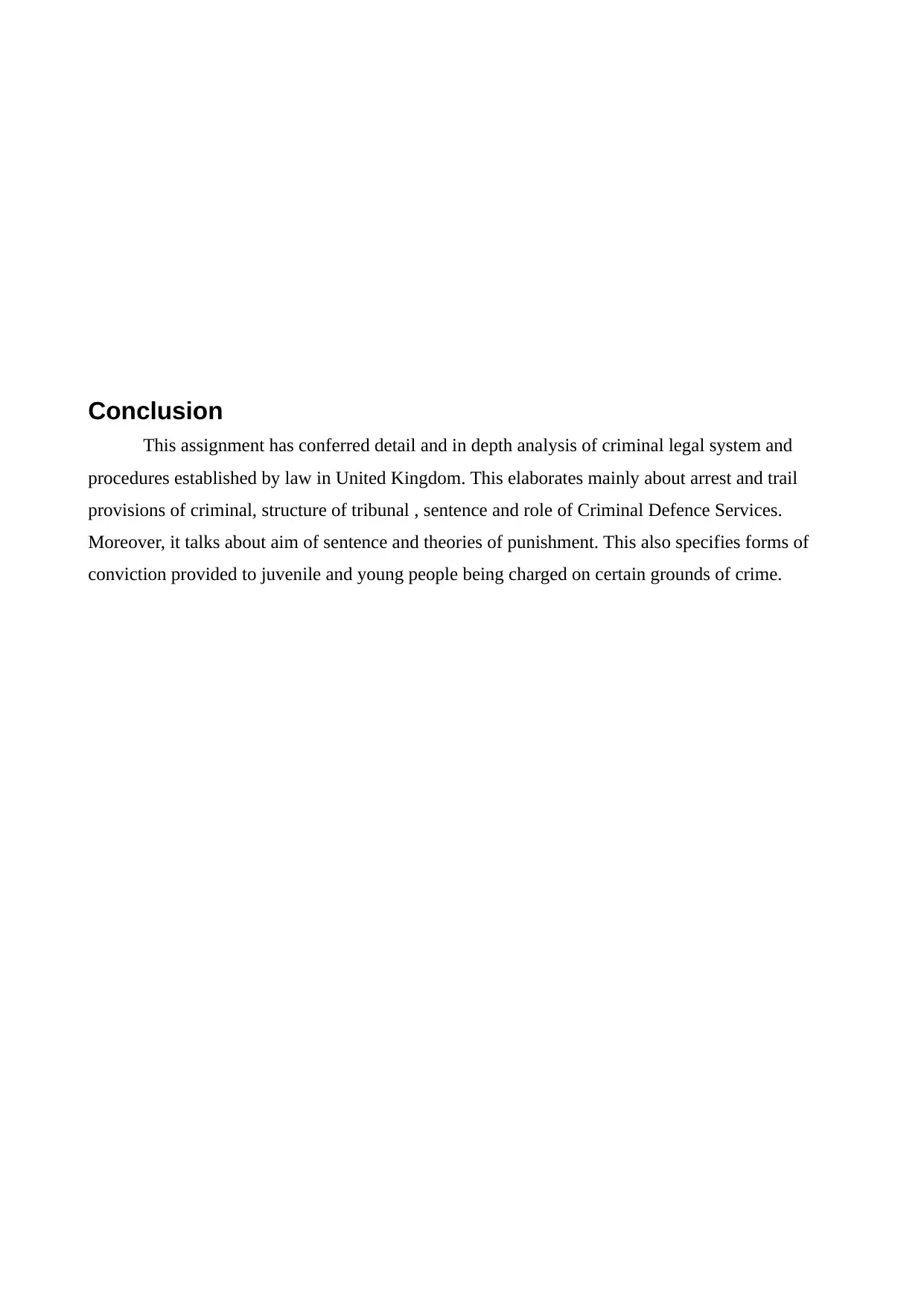
Conclusion
This assignment has conferred detail and in depth analysis of criminal legal system and
procedures established by law in United Kingdom. This elaborates mainly about arrest and trail
provisions of criminal, structure of tribunal , sentence and role of Criminal Defence Services.
Moreover, it talks about aim of sentence and theories of punishment. This also specifies forms of
conviction provided to juvenile and young people being charged on certain grounds of crime.
This assignment has conferred detail and in depth analysis of criminal legal system and
procedures established by law in United Kingdom. This elaborates mainly about arrest and trail
provisions of criminal, structure of tribunal , sentence and role of Criminal Defence Services.
Moreover, it talks about aim of sentence and theories of punishment. This also specifies forms of
conviction provided to juvenile and young people being charged on certain grounds of crime.
Paraphrase This Document
Need a fresh take? Get an instant paraphrase of this document with our AI Paraphraser
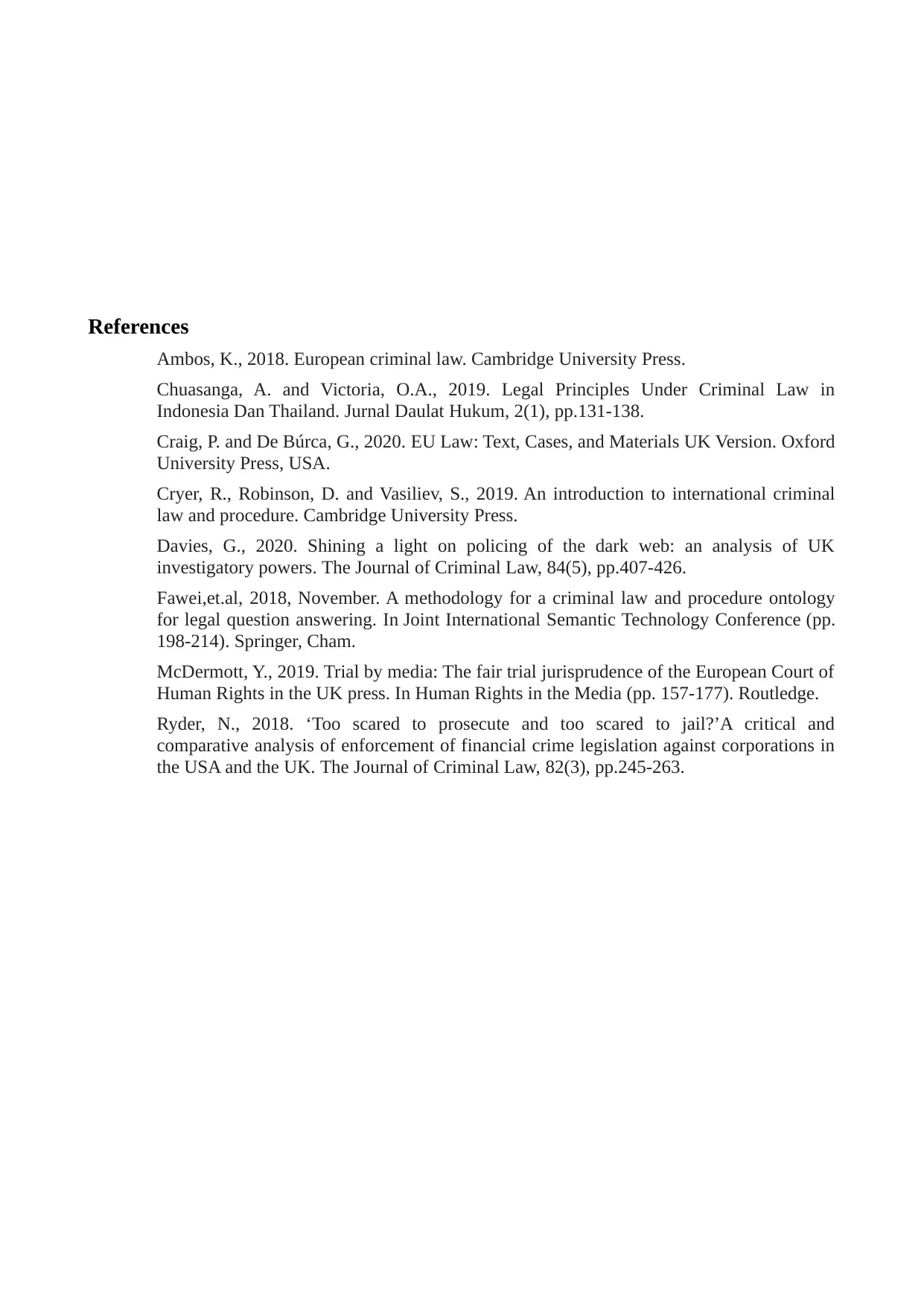
References
Ambos, K., 2018. European criminal law. Cambridge University Press.
Chuasanga, A. and Victoria, O.A., 2019. Legal Principles Under Criminal Law in
Indonesia Dan Thailand. Jurnal Daulat Hukum, 2(1), pp.131-138.
Craig, P. and De Búrca, G., 2020. EU Law: Text, Cases, and Materials UK Version. Oxford
University Press, USA.
Cryer, R., Robinson, D. and Vasiliev, S., 2019. An introduction to international criminal
law and procedure. Cambridge University Press.
Davies, G., 2020. Shining a light on policing of the dark web: an analysis of UK
investigatory powers. The Journal of Criminal Law, 84(5), pp.407-426.
Fawei,et.al, 2018, November. A methodology for a criminal law and procedure ontology
for legal question answering. In Joint International Semantic Technology Conference (pp.
198-214). Springer, Cham.
McDermott, Y., 2019. Trial by media: The fair trial jurisprudence of the European Court of
Human Rights in the UK press. In Human Rights in the Media (pp. 157-177). Routledge.
Ryder, N., 2018. ‘Too scared to prosecute and too scared to jail?’A critical and
comparative analysis of enforcement of financial crime legislation against corporations in
the USA and the UK. The Journal of Criminal Law, 82(3), pp.245-263.
Ambos, K., 2018. European criminal law. Cambridge University Press.
Chuasanga, A. and Victoria, O.A., 2019. Legal Principles Under Criminal Law in
Indonesia Dan Thailand. Jurnal Daulat Hukum, 2(1), pp.131-138.
Craig, P. and De Búrca, G., 2020. EU Law: Text, Cases, and Materials UK Version. Oxford
University Press, USA.
Cryer, R., Robinson, D. and Vasiliev, S., 2019. An introduction to international criminal
law and procedure. Cambridge University Press.
Davies, G., 2020. Shining a light on policing of the dark web: an analysis of UK
investigatory powers. The Journal of Criminal Law, 84(5), pp.407-426.
Fawei,et.al, 2018, November. A methodology for a criminal law and procedure ontology
for legal question answering. In Joint International Semantic Technology Conference (pp.
198-214). Springer, Cham.
McDermott, Y., 2019. Trial by media: The fair trial jurisprudence of the European Court of
Human Rights in the UK press. In Human Rights in the Media (pp. 157-177). Routledge.
Ryder, N., 2018. ‘Too scared to prosecute and too scared to jail?’A critical and
comparative analysis of enforcement of financial crime legislation against corporations in
the USA and the UK. The Journal of Criminal Law, 82(3), pp.245-263.
1 out of 8
Related Documents
Your All-in-One AI-Powered Toolkit for Academic Success.
+13062052269
info@desklib.com
Available 24*7 on WhatsApp / Email
![[object Object]](/_next/static/media/star-bottom.7253800d.svg)
Unlock your academic potential
Copyright © 2020–2026 A2Z Services. All Rights Reserved. Developed and managed by ZUCOL.





